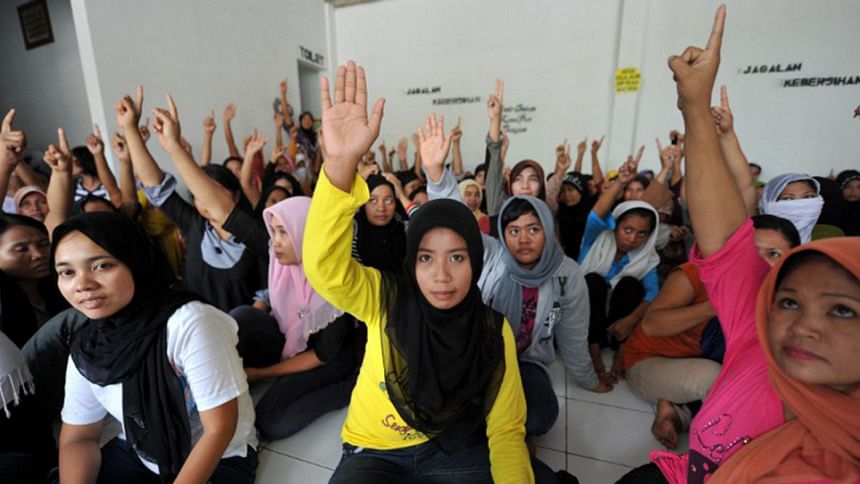Who really does Saudi Arabia's housework?

Disagreements about who should do housework blew up on Twitter in Saudi Arabia this week, and offered some insight into popular attitudes in the country.
If you're a Westerner, you might think this is another story about who should load the dishwasher, or about men not pulling their weight at home.
But this was a very different conversation, about where wealthy Saudi families should source their servants - from abroad, as is standard, or women from southern parts of the kingdom.
It began when Haya al-Mani - one of the country's few female politicians - made an official proposal that women be given the right to drive. It's a well worn topic, but still a controversial issue in the country, and her suggestion was fiercely opposed by religious hardliners on Twitter.
One such opponent - Sa'id Hussein al-Zahrani - was keen to discredit al-Mani and posted a tweet about an article she had reportedly written more than 30 years ago about domestic labour.
"Do you know that Haya al-Mani, who advocates allowing women to drive, also called for replacing foreign maids with southerners" he tweeted.
In the article, written sometime in the early 1980s, al-Mani is reported to have said the nation's wealthy citizens should stop employing foreign workers to clean their homes, and employ poorer Saudi women from southern areas of the kingdom. It would make better use of the country's own resources, she claimed.
The response on Twitter was swift and vociferous. A hashtag using her name - #HayaAl-ManiSuraCouncilMP - was used more than 100,000 times in a little over a day.
The general sentiment was fury, both at the idea that any Saudi women should work as domestic labourers, and that the politician had singled out women from the south - a region stereotypically viewed as poorer than the rest of the country.
"I swear to God, Saudi girls from the north to the south and from the east to the west will never work as servants. May our heads remain high up, breathing the air and honouring our daughters," wrote one.
A few lone voices were angry at their fellow citizens for demeaning manual labour, and suggesting that it should be left to foreign workers: "Working as a servant is not wrong. If it was, why would you accept it for an Indonesian or a Filipino? Or do you think you are special?"
But they were few and far between. Most couldn't stomach the idea of Saudi women working as domestic servants.
"The ladies of the south are much more honourable and greater than you. The ladies of the south were not born to be maids," read another typical comment.
In addition to criticism of the MP, and calls for her to be dismissed from parliament, many took the opportunity to attack the idea of female politicians, a relatively new phenomenon in the country.
Women were allowed to participate in the country's consultative Shura Council for the first time in 2013, when Saudi Arabia's late King Abdullah appointed 30 women to the previously all-male body.
"This is the result of having women in the Shura Council instead of giving them a salary to stay at home to prepare men for the fields of science and work and for serving the nation and religion," one user said.
Al-Mani has responded to the criticism. In an interview with a pro-government paper she said her words were taken out of context. "It was part of an old newspaper report published in the 1980s," she said.

 For all latest news, follow The Daily Star's Google News channel.
For all latest news, follow The Daily Star's Google News channel. 








Comments